
80.4K
Downloads
79
Episodes
Anaesthesia is the official journal of the Association of Anaesthetists and is international in scope and comprehensive in coverage. It publishes original, peer-reviewed articles on all aspects of general and regional anaesthesia, intensive care and pain therapy, including research on equipment. Rapid Sequence podcasts offer an insight into our journal, publications, editors, reviewers, authors and readers. Each episode is short, concise and packed full of CPD for all your educational needs.
Episodes

Friday Dec 16, 2022
The association between iron deficiency and outcomes - PREVENTT
Friday Dec 16, 2022
Friday Dec 16, 2022
Pre-operative anaemia is common in patients undergoing non-cardiac surgery and associated with an increased risk of blood transfusion, hospital length of stay and postoperative complications.
This podcast is all about a new secondary analysis of the PREVENTT study. We are delighted to be joined in Australia by three of the papers authors, Professor Toby Richards, Dr Anastazia Keegan and Professor Lachlan Miles.
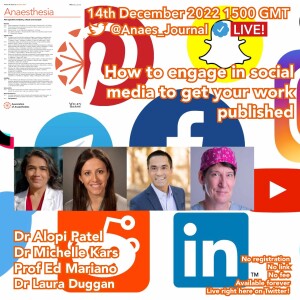
Thursday Dec 15, 2022
How to engage in social media to get your work published
Thursday Dec 15, 2022
Thursday Dec 15, 2022
Today, we were joined by three authors (Dr Alopi Patel, Dr Michelle Kars and Prof Ed Mariano) of a new paper which is all about how to use social media to get published. This forms part of a new series of articles called Reviewer Recommendations, which is very much a ‘how to’ guide for authors and readers. Enjoy!
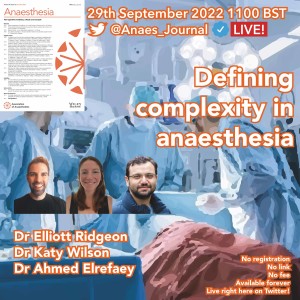
Sunday Oct 02, 2022
Defining complexity in anaesthesia
Sunday Oct 02, 2022
Sunday Oct 02, 2022
Today we will be discussing this new paper which describes and validates a new anaesthetic complexity score, which is is a clinician-designed, real-world tested model of case complexity in anaesthetics. It is inclusive of, but distinct from, patient and surgical risk.
The paper is of interest because of the methods used and also the potential implications for increasing efficiency and productivity in theatre. Joining us today we have authors Dr Elliott Ridgeon, Dr Katy Wilson and Dr Ahmed Elrefaey.
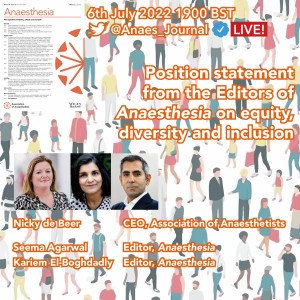
Sunday Jul 10, 2022
Sunday Jul 10, 2022
The Editors of Anaesthesia acknowledge the EDI problems we face in anaesthesia and medicine as a whole. Without taking action to address these problems, these issues will persist.
For this podcast, the principal authors join Association of Anaesthetists CEO Nicky de Beer to discuss why and how the statement was written as well as its implications for the present and future.
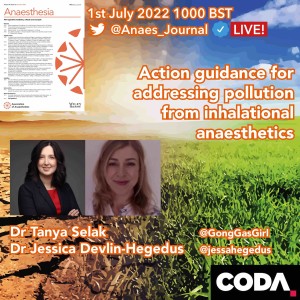
Sunday Jul 03, 2022
Action guidance for addressing pollution from inhalational anaesthetics
Sunday Jul 03, 2022
Sunday Jul 03, 2022
Climate change is a real and accelerating existential danger. Urgent action is required to halt its progression, and everyone can contribute. Pollution mitigation represents an important opportunity for much needed leadership from the health community, addressing a threat that will directly and seriously impact the health and well-being of current and future generations.
Inhalational anaesthetics are a significant contributor to healthcare-related greenhouse gas emissions and minimising their climate impact represents a meaningful and achievable intervention. A challenge exists in translating well-established knowledge about inhalational anaesthetic pollution into practical action.
For this podcast, @GongGasGirl interviews @jessahegedus about how they did it and why it is important.
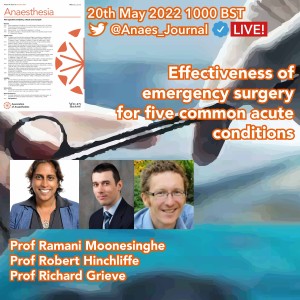
Saturday May 21, 2022
Effectiveness of emergency surgery for five common acute conditions
Saturday May 21, 2022
Saturday May 21, 2022
There is very limited evidence about the relative effectiveness of emergency surgery vs. non-emergency surgery strategies for patients with common acute conditions. This lack of evidence means that there is likely to be considerable practice variation in the NHS in England.
The ESORT study, which was published last night, aimed to compare the effectiveness of emergency surgery or not for five acute abdominal conditions.
Joining us this morning we have three authors of this excellent new paper, Professors Moonsinghe, Hinchliffe and Grieve.
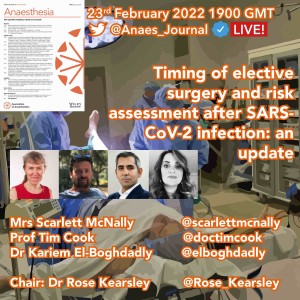
Friday Feb 25, 2022
Friday Feb 25, 2022
This new guideline provides an update to the previously published consensus statement on SARS-CoV-2 infection, COVID-19 and timing of elective surgery to assist policymakers, administrative staff, clinicians and patients. It focuses on the omicron variant, which is now strongly dominant in many countries. However, the principles may also be of relevance to future variants.
To set the paper in its context, Rose Kearsley speaks with authors Scarlett McNally, Tim Cook and Kariem El-Boghdadly. Five thousand watched the broadcast, catch up with the audio recording here!
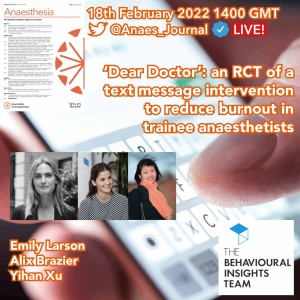
Sunday Feb 20, 2022
Sunday Feb 20, 2022
Joining us today we have the authors of a new paper reporting the effect of a text message intervention on burnout in trainee anaesthetists.
First we have Emily Larson who is a Senior Advisor at The Behavioural Insights Team. Emily has worked on reducing burnout and increasing wellbeing with physicians, educators and children. We also have Dr Alix Brazier who is also a Senior Advisor at The Behavioural Insights Team and currently leads BIT’s work applying behavioural insights to improve healthcare. Alix is also a PhD student at Imperial College, London, who also supported this research.
Finally, we have Dr Yihan Xu who is a research advisor at The Behavioural Insights Team and she designs and runs rapid online or field trials to inform and improve the delivery of government services in public health and education, for clients like the Department of Health and Social Care, the NHS, the Education Endowment Foundation, and the Ministry of Defence.
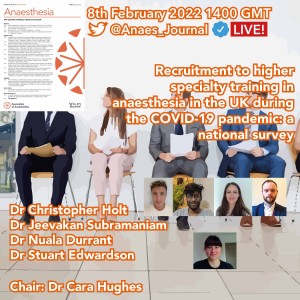
Wednesday Feb 09, 2022
Wednesday Feb 09, 2022
There were more applications for higher specialty training posts in anaesthesia in the UK starting in August 2021 than in previous years, with approximately two-thirds being unsuccessful.
This new national survey is all about recruitment to higher specialty training in anaesthesia in the UK during the COVID-19 pandemic. Joining Dr C Hughes was Dr C Holt, Dr J Subramaniam, Dr N Durrant and Dr S Edwardson. Their results suggest that junior anaesthetic doctors in the UK negatively perceived postgraduate training structures and changes to the postgraduate curriculum and experienced difficulties in securing higher training. This is a ‘must listen’ for all trainees and all those involved with training. Enjoy!
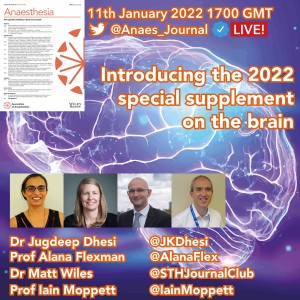
Thursday Jan 13, 2022
Peri‐operative and critical care management of the brain ‐ current evidence
Thursday Jan 13, 2022
Thursday Jan 13, 2022
What better way to see in any new year than with a brand-new Anaesthesia Special Supplement! This year, it is all about the peri-operative and critical care management of the brain, which has been guest edited by Dr Jugdeep Dhesi and Professor Alana Flexman. Joining us also were journal Editors Professor Iain Moppett and Dr Matt Wiles. Topics include:
- Chronic SDH
- Peri-operative neurocognitive disorders
- COVID-19-associated delirium
- Mode of anaesthesia for mechanical thrombectomy
- Status epilepticus
- Cerebral oximetry
30 minutes of high quality CPD for all. Enjoy!
